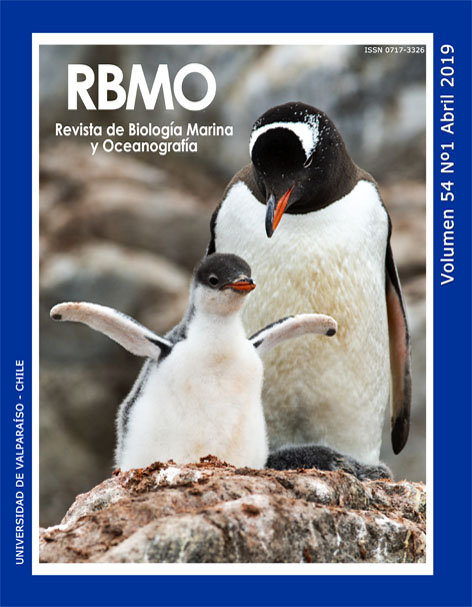Efecto de la temperatura sobre la tasa de consumo del vitelo y gota de aceite en las larvas del pargo flamenco Lutjanus guttatus (Perciformes: Lutjanidae)
DOI:
https://doi.org/10.22370/rbmo.2019.54.1.1463Palabras clave:
Larvas de pargo flamenco, Eclosión, Crecimiento, Reservas energéticasResumen
El vitelo es la principal fuente de energía para huevos y larvas vitelinas de peces marinos. La temperatura tiene un papel dominante en la eficiencia de la conversión del vitelo en tejido corporal y afecta el tamaño que puede alcanzar la larva en la primera alimentación. En el presente trabajo se evaluó el efecto de diferentes temperaturas sobre el consumo del saco vitelino y la gota de aceite de pargo flamenco, Lutjanus guttatus, para determinar la temperatura adecuada de cultivo para larvas vitelinas. Los huevos fertilizados de pargo flamenco se colocaron en tinas de plástico de 20 L a temperaturas de 22, 25, 28 y 31 °C con tres réplicas por tratamiento. Se determinó el tiempo y porcentaje de eclosión, longitud total, tasas de consumo de vitelo (TCV) y de gota de aceite (TCGA) a las 0, 24, 48 y 72 h después de la eclosión (HDE). Los huevos incubados a 22 °C no eclosionaron. No se observaron diferencias significativas en el porcentaje de eclosión entre tratamientos de 25, 28 y 31°C. Las larvas a 31 °C presentaron mayor longitud al eclosionar y menor HDE que las que estuvieron a 25 °C. La TCV y TCGA fue mayor en las larvas a 31 °C a 0 y 24 HDE. Se presentó mortalidad total en las larvas incubadas a 25 y 31 °C a las 48 y 72 HDE, respectivamente. La temperatura adecuada para la incubación de huevos y larvas de L. guttatus se debe llevar a cabo a 28 °C para favorecer el consumo de sus reservas energéticas adecuado para su crecimiento y supervivencia.
Descargas
Descargas
Publicado
Número
Sección
Licencia
Derechos de autor 2019 María Isabel Abdo-de la Parra, Gustavo Alejandro Rodríguez-Montes de Oca, L. Estela Rodríguez-Ibarra, José Cristóbal Román-Reyes, Gabriela Velasco-Blanco

Esta obra está bajo una licencia internacional Creative Commons Atribución-NoComercial 4.0.
• Los autores que publican en la RBMO transfieren sus derechos de publicación a la Universidad de Valparaíso, conservando los derechos de propiedad intelectual para difundir ampliamente el artículo y la revista en cualquier formato.
• La RBMO autoriza el uso de figuras, tablas y extractos breves de su colección de manuscritos, en trabajos científicos y educacionales, siempre que se incluya la fuente de información.






